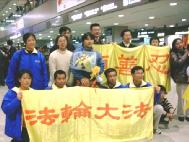Japanese Practitioner Returns Home After Appealing for Falun Gong at Tiananmen Square in Beijing
(Clearwisdom.net) At 7 p.m., on February 17, 2002, Japanese Falun Dafa practitioner Takehiko Kanai arrived at the Narita Airport in Tokyo and received a warm welcome from over ten practitioners from Tokyo and Yokohama Takehiko, from Tokyo's Setagaya District, works in accounting. He just came back from Beijing after appealing at Tiananmen Square for Falun Dafa, which has been persecuted for more than two and a half years by Jiang's government. At the airport, Takehiko was interviewed by local media and told his story about his arrest and his witnessing of police savagery in Beijing.
 |  |
| A young practitioner: I have come to welcome you back | Fellow practitioners being photographed together |
 |  |
| Local media interview Takehiko | |
1. Witnessing the police savagery in Beijing
On February 11, Takehiko arrived alone in Beijing. He came to protest the current regime's brutal persecution of Falun Gong. At 2 p.m., on February 14, Takehiko avoided the police's interrogations of the western tourists at closely guarded Tiananmen Square due to his Asian face, and was able to open the banner with the words, "The World Knows Falun Dafa Is Good!" At the same time, he called out loudly, "The World Knows Falun Dafa Is Good!" Many overseas practitioners at Tiananmen Square started the demonstration at almost the same time. Immediately, large numbers of police rushed out and surrounded him and the western practitioners near him. Seven or eight policemen grabbed his left arm and dragged him to a police car. The taller and larger western practitioners tried to protect him by surrounding him. They suffered violent beatings.
Takehiko and some western practitioners were sent to the Tiananmen detention house. After being detained for several hours, they were moved and detained in a hotel. Several practitioners, perhaps from Taiwan, were detained at the same time. After talking to the police in Chinese, they suffered much more violent beatings than western practitioners and were immediately moved to a place used to detain domestic practitioners. The next day, Takehiko and some western practitioners were moved to a detention center in Beijing. Although there was a language barrier, through writing Chinese words on a piece of paper, he had a chance to tell the truth to a prisoner and taught him the five exercises.
2. Tortured by police who were totally deluded by the government propaganda and the fabricated stories
Takehiko said that although he was mentally prepared to face the policemen who didn't know the truth, he still felt quite shocked to see how much they had been deceived. In fact, these policemen were told that Falun Gong was regarded as X religion and was outlawed worldwide. They showed very brutal and savage behavior towards the practitioners and often waved their fists around and shouted "Shut up." They prohibited practitioners from sitting down and even rejected their requests to go to the bathroom. They confiscated all personal Dafa books from the practitioners. After the practitioners kept clarifying the truth and showing consistently benevolent hearts, some police began to change and became friendlier. One of them gave a Dafa book back to a black practitioner who always smiled at them.
3. Required to sign blank papers
Takehiko pointed out that the interrogation conducted during his detention was one-sided. He was not allowed to ask for an interpreter or contact the Japanese embassy. He could only manage to communicate with police by writing down Chinese characters or broken English words on paper. During the interrogation, he was asked many times to sign documents he was not able to understand and was even requested to sign some blank papers. He refused to cooperate with such requests.
4. Concerned about western practitioners who were still detained at the time he was sent home
Due to the language barrier, Takehiko was not able to communicate much with the western practitioners during his detention, but he still joined them in studying the Fa, practicing exercises and sending forth righteous thoughts. He experienced that the firm belief in "Truthfulness, Compassion and Tolerance" could overcome any barriers. He mentioned several practitioners from Sweden who were on hunger strike and still detained at the time he was sent home, and expressed concern over their situation.
5. Human rights have no national boundaries; human morality needs to be upheld by all.
When he was asked his purpose for the trip, Takehiko stated the following: He had greatly benefited from practicing Dafa. He learned from Dafa how to treat all people kindly. He felt deep pity for those precious Chinese people who should have chances to benefit much more from practicing Dafa due to their advantages in language and the region they lived; however many have lost this great opportunity because of being deceived by the lies from the persecutors. Throughout the trip, he felt the urgency to let those people know the truth. He stated that there are no boundaries among countries on the issue of human rights, and that human morality needs to be upheld by all. He hoped to pass a message to Japan and the international community through his trip, that more people would realize the significance of supporting Falun Gong because of its profound moral teachings and the principles of "Truthfulness, Compassion and Tolerance." He said he would continue his efforts until the persecution of Falun Gong in China is stopped.